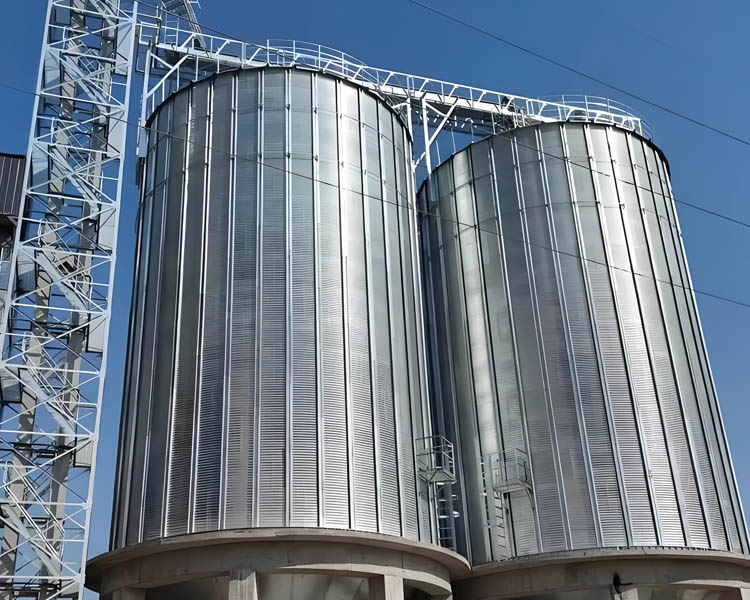Introduction to Stainless Steel Silos
Stainless steel silos are cylindrical storage containers designed for bulk materials, including grains, powders, liquids and industrial chemicals. Known for their durability, corrosion resistance and efficient storage capabilities, stainless steel silos play a vital role in various industries such as food processing, pharmaceuticals, chemicals, agriculture and construction.
These silos have evolved over a long history of development to provide enhanced security, longevity, and customization to meet diverse storage needs. If you are considering purchasing a stainless steel silo, it is vital to understand the different types available and their respective benefits.

Types of Stainless Steel Silos
Stainless steel silos can be categorized based on their construction method, shape and function.
1. According to the method of construction of the silo
Bolted Steel Silos
Bolted steel silos are modular storage units made of prefabricated steel plates bolted together. They are commonly used for storing grains, feed, chemical powders, cement and coal ash.
Features of bolted steel silos:
- Modular assembly for easy transportation and quick on-site installation.
- Hermetically sealed for storing powders, liquids and granules.
- Storage capacities range from 50 to 15,000 tons, making them ideal for large-scale applications.
- Low maintenance costs as only damaged parts need to be replaced.
Spiral Steel Silo(Lipp Silo)
Spiral steel silos are constructed on site using specialized forming technology. They are widely used for grain, cement and other bulk materials.
Spiral steel silo features:
- Rolling construction on site ensures fast installation and large storage capacities (1,000 – 15,000 tons).
- High structural strength to withstand environmental factors such as wind and earthquakes.
- No exposed bolts, reducing the risk of rust and weather-related degradation.
- Low maintenance costs with a service life of over 25 years.
Welded Steel Silos
Welded steel silos are fully enclosed storage solutions made through a monolithic welding process and are ideally suited for materials that require containment, such as fly ash, cement and chemicals.
Welded steel silo features:
- Hermetically sealed to prevent leakage and contamination.
- Designed for harsh conditions such as extreme temperatures, high humidity and chemical exposure.
- Service life in excess of 30 years.
- Highly customizable in size, shape and material selection.
2. Based on silo shape
Round Silos: Most common due to their structural stability and ease of maintenance.
Square/polygonal silos: designed for specific site layouts and storage needs.
3. Based on the function of the silo
General purpose storage silos: Used for storing a variety of bulk materials.
Insulated Silos: Insulated design for storing temperature sensitive materials such as food and pharmaceuticals.
Main features of stainless steel silos
Corrosion resistance: Stainless steel prevents rust and chemical degradation, ensuring long-term use.
High strength: can withstand high pressure and impact, providing safe material storage.
Airtight: Welded silos in particular provide airtight storage, protecting materials from contamination.
Easy to maintain and clean: the smooth stainless steel surface is easy to clean and meets the hygiene standards required in industries such as food and pharmaceuticals.
Things to consider before buying a stainless steel silo
To ensure that you choose the stainless steel silo that best suits your needs, please consider the following factors:
1. Determine storage requirements
Material type (powder, granules, liquid or bulk solids)
Chemical properties, density and flow characteristics
2. Determine the storage capacity
According to the scale of production and turnover cycle, select the appropriate storage capacity (from a few tons to 15,000 tons).
3. Evaluate the installation environment
Consider whether the silo will be installed indoors or outdoors.
Evaluate environmental factors such as temperature, humidity and chemical exposure.
4. Evaluate the quality of fabrication
Check weld quality, surface finish and structural integrity.
Ensure compliance with industry regulations for food, pharmaceutical or chemical storage.
5. Choose the right accessories
The feeding system, unloading mechanism, monitoring sensors and control equipment should meet the operational needs.
6. Compare costs and suppliers
Evaluate different manufacturers based on product quality, service life and maintenance costs.
Compare prices to select cost-effective solutions without compromising durability and performance.
Stainless steel silos provide a reliable and efficient storage solution for various industries. Whether you need a bolted, spiral, or welded steel silo, selecting the right option will enhance storage efficiency and longevity while reducing maintenance costs.
Leave a Reply